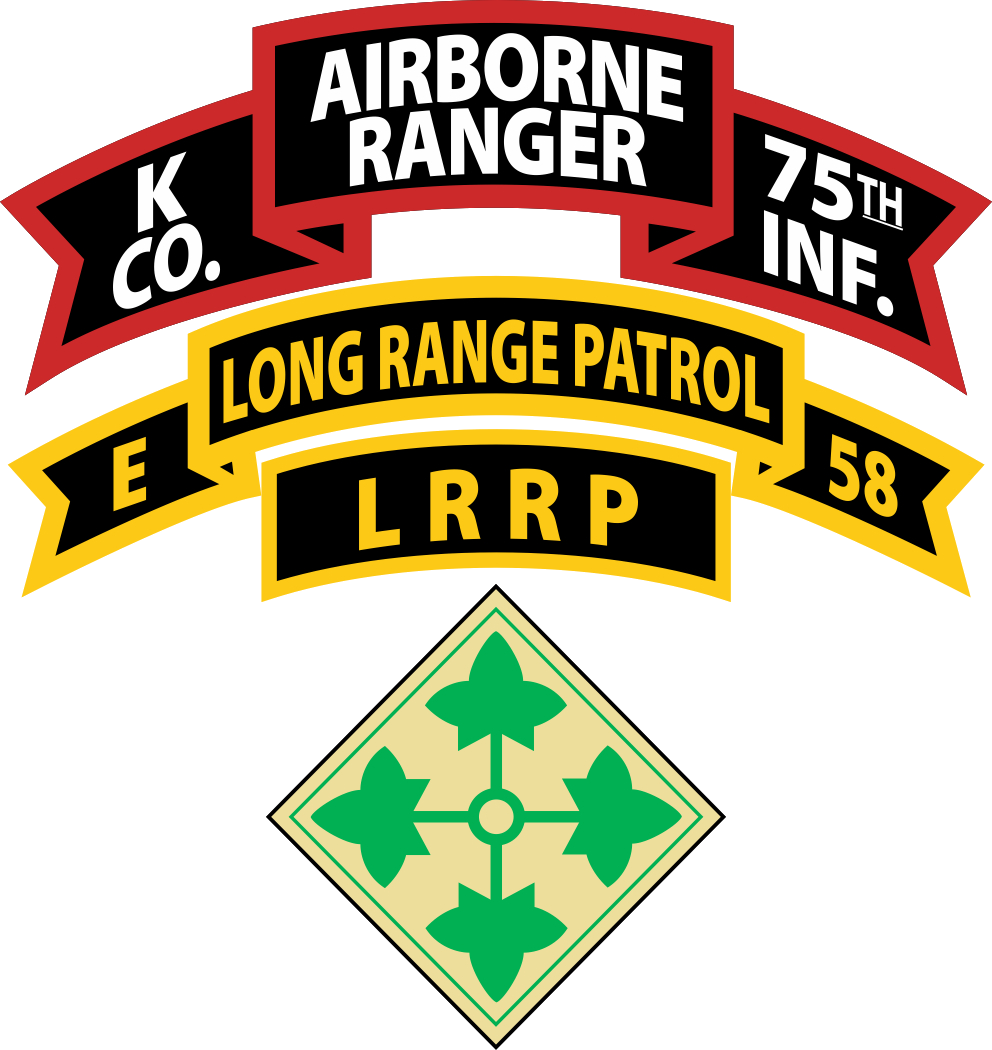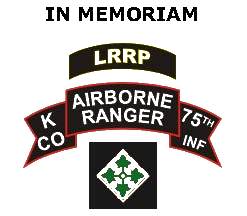
DEAN ALLEN BORNEMAN
January 20, 1949 – January 23, 1970
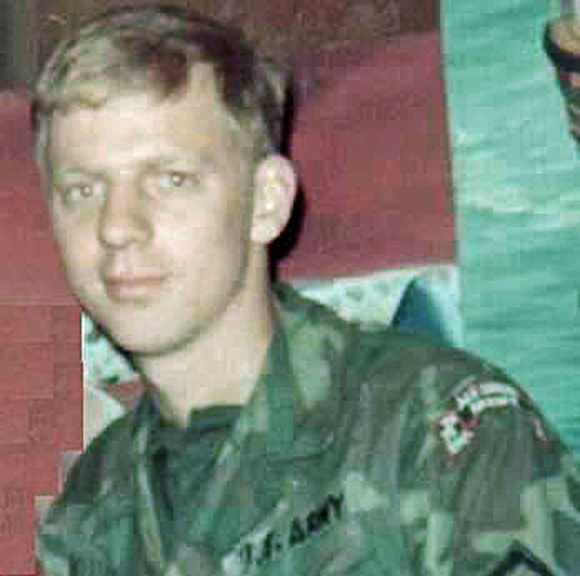
Dean was born in the robust farming community of Dumont, Iowa to parents August Louie Borneman (1923-1996) and Lila Miller Borneman (1925). His parents were the first generation born in America to German immigrants. During and after the end of WWII, German ancestry was not looked upon favorably by all Americans – it was a difficult climate in which to raise children. Dean, along with his older brother Douglas Borneman (1946) and younger brother Dalton L. Borneman (1955) discovered their values in hard work and community service. Their’s was a family admired by many in Dumont and respected by all. Dean and his brothers graduated from Dumont High School, Dean in the Class of 1966. Dean would separate himself from the vast cornfields of Iowa and opt for the adventure and challenge of becoming a soldier. Not simply a soldier, but a LRRP / Ranger in the big, bad and always dangerous Central Highlands of Vietnam. Dean decided if he were going to be there, he would do the most he could to make his family proud. He volunteered for the LRRPs (Long Range Reconnaissance Patrol) of the 4th Infantry Division. In the initial stages of the United States presence in Vietnam, the clear lack of real-time intelligence nearly allowed the NVA to overrun our forces in the Ia Drang, a battle related in the book and movie “We Were Soldiers Once….and Young”. Shortly after that hard-won battle, the 1st Cav was replaced by the 4th Infantry Division with the mission to “Tame the Ia Drang”. One of the first decisions was to determine how best to know the enemy. The solution was to insert 4-man teams of Rangers, then called LRRPs, to surreptitiously live in the jungle amongst the enemy. They would be inserted into the jungle for extended missions and patrol an area of suspected enemy concentration to uncover weaknesses and eliminate when possible. Later, in 1969, an Army-wide re-designation of all LRRPs transitioned them into Company K (Ranger), 75th Infantry (Airborne). Dean and the teams from K/ 75th Rangers went to battle running missions out of Pleiku and An Khe as well as the infamous Firebase “Oasis” in Kontum Province. His decision to volunteer was courageous and dangerous, but no young soldier who proudly wore the “Tiger Stripe Fatigues” ever regretted that decision.
After extensive training Dean began his tour in Vietnam on September 17, 1969. While it was only 2 months earlier than his team mate Billy, 2 months in a Ranger unit gained a warrior more experience than most soldiers saw during their entire tour. Dean joined Team Romeo-28 for the first time on October 24th, 1968. Team Leader Jim England, ATL Dennis Hopfinger, Joe Baltes and Dean were tasked with observing enemy movement in a sparsely forested area 35 KM SE of Pleiku. Their efforts paid off when they discovered a large cache of rice, weapons and other intelligence adjacent to an indigenous village.
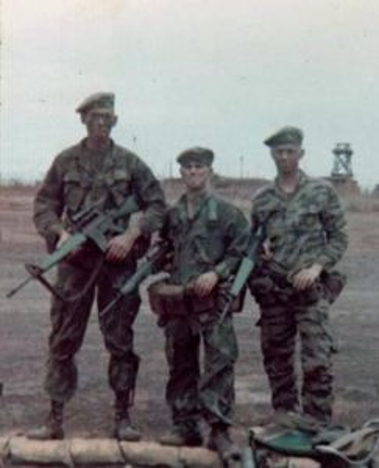
By January of 1970, R-28’s four-man team of Team Leader Jim England (Opelika, AL), ATL Chuck Weidner (Bethpage, NY), Dean Borneman (Dumont, IA) and Billy Bartholomew (Catasauqua, PA) were confident they had found “the groove”. They were all very comfortable with each other and had grown to be fast friends. Each knew they could count on the courage of the other. TL Jim England was sent on Rest & Relaxation leave (R & R) in late January. Rather than allow the team to remain dormant in his absence, Charlie Weidner was made Team Leader and an additional Ranger was assigned to temporarily fill the missing position. So it was, the four warriors of R-28 were inserted into the jungles to face the awaiting danger. On the 23rd, a Friday, the team made contact with a superior enemy force. Billy was mortally wounded in the initial violent volley and Dean rushed to attend his friend. His courageous, selfless action knowingly exposed him to the enemy and he quickly sustained mortal wounds. Charlie Weidner was able to render aid to both fallen men while they held the enemy at bay awaiting relief from gunships and a reactionary force. Both Billy and Dean succumbed to their wounds and were mourned by the entire Company. TL Jim England who had arrived back from R & R too late to lead this mission, carried with him and often spoke of the survivor’s guilt for 45 years until his own death in 2014. Jim named his second son Dean and wrote a book “Long Range Patrol Operations” dedicated to Dean. We honor both these fallen Rangers of Romeo-28 on the 50th anniversary of their loss. They have never been forgotten.
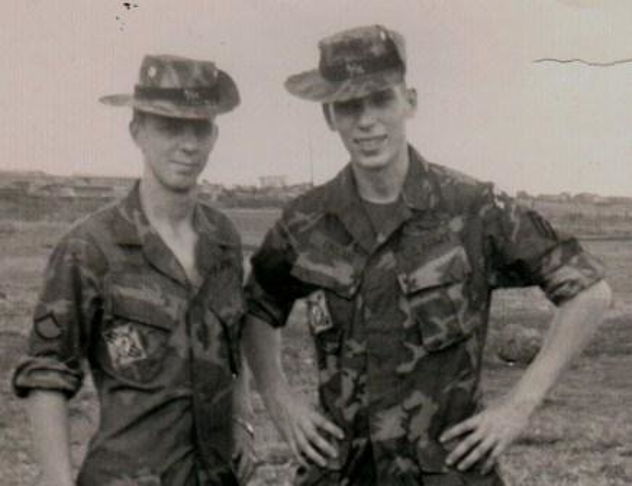
Both of these warriors joined K 75th despite the extreme risk, perhaps because of it. Many people have asked why would one do that. There are as many reasons for their choice as there are men. All share the trait of courage and willingness to give their all for their brother Rangers and their country. Some Rangers are never placed in mortal danger, while others seem to attract it. The circumstances of their death cannot diminish the courage and heroism shown by these young warriors the moment they chose to become Rangers. Some Rangers are destined to die surrounded by expended brass and the bodies of their enemy, others will die many years after their service, unharmed, in a warm bed surrounded by their loved ones. All will be remembered as having been among the best this nation can send to war. All are heros. They never needed to show their courage with results, their decision to risk everything for the promise of nothing made that un-necessary. Each Ranger carries with them a bit of the honor earned, with great sacrifice, by each other Ranger. Fifty years have passed while we hardly noticed. Our lives have now been mostly lived, yet we’ve continued to carry their memories and maintained their fellowship in our hearts for all this time without once forgetting their sacrifice. They, as well as all the courageous brothers we lost, continue to inspire us today as certain as they did when they were causing havoc to our enemy in the violent Central Highlands.
William Henry Bartholomew died at the age of 21. and Dean Allen Borneman 3 days after his 21st birthday. Their names are inscribed and honored on the Vietnam Memorial Wall, Billy at Panel 14W Line 60 and Dean at 14W Line 58 in Washington, DC by an eternally grateful nation. In addition and perhaps more importantly, their names are inscribed forever in the hearts and memories of every Ranger. In 50 years, the admiration and respect for these men has not diminished even slightly in the minds of all who know of them. They were Rangers who truly “Led the Way”.

Notes from Charles Weidner March 3, 2019, Posted January 21, 2021
I was tracked down by the niece of our former Comrade-in-Arms, and my teammate, Dean Borneman. Dean was killed in Vietnam in January 1970. She was doing a family heritage project and asked me what I could tell her about Dean. She told me that he died when she was too young to remember him. Her only memory was a collection of objects like the folded flag, etc. As a child she was told not to touch anything and never ask or talk about her uncle. I guess the loss was too hard to deal with and it was best not to bring up the hurt of such a great loss.
Of course, I was willing to give her some insight into just who her uncle was and about his participation in the Vietnam War. I didn’t know if I could speak to her about Dean without too much crying so I suggested that she give a week or so and I would send her what information I could remember as being significant or interesting. So, for a few days, with frequent breaks for crying, I wrote the attached “remembrances.”
Remembrances of Dean Borneman in Vietnam
Dean Borneman was a good friend and a good soldier. We served together as volunteers with Company K 75th Infantry Ranger Regiment in Vietnam. Company K was a Ranger Company attached to the 4th Infantry Division which was assigned to an area of Vietnam called “The Central Highlands.”
The Central Highlands was an area in the II (Roman Numeral for 2) Corp region of South Vietnam. II Corp stretched across South Vietnam near its center and spanned from the South China Sea in the east to the borders of Cambodia and Laos to the west. There was a range of mountains near the coastline and moving west was a large high central plain followed by high and rugged mountains. The mountains were so impassable that native peoples on opposite sides of this mountain barrier were of distinctly different races and spoke different languages. These were the mountains where Dean and I worked.
In those days there was a military draft. All males became eligible to be drafted into the military service after their 18th birthday. I was going to Trade School/Junior College at 18 and had a student deferment. My father died that same year of colon cancer, he was 42 years old, and I left school and started working. I got a “head of household” deferment and was safe from the draft. But the Draft Board continually checked on me: Was I still working? Was I still living at my mother’s address? What were our financial positions? I didn’t feel secure about my continued draft status so I decided to enlist and get my military obligation over with before I got any older when it may disrupt my life in a more inconvenient way.
I enlisted into the Army after getting a letter describing the new 2 year enlistment option (normal enlistments were all 3 or 4 years). I had to enlist in one of the “combat arms” and I choose infantry. So, seven days after my 21st birthday, I became a soldier.
The Army was easy for me. I was a bit older than most of the others and a lot more mature. I did well receiving my Private E-2 stripe while still in basic training in Fort Gordon, GA. During infantry training at Fort Ord, California I earned the rank of Private First Class with less than 4 months in the Army. After graduation I was sent to Non-commissioned Officer Candidate training in Fort Benning, GA.
By the time I got to Vietnam I had been in the Army for more than one year, attained the rank of Sergeant E-5 and all that time I was in training. After volunteering for duty as a Ranger (all Rangers are volunteers) I was sent to Pre-Recondo training to qualify for the Rangers. I graduated as one of the top 4 candidates and we went to Na Trang, Vietnam to study under the 5th Special Forces Group at the MACV Recondo School. Three of us graduated among the top ten graduates for that training cycle. We were awarded the Recondo Badge which we could then proudly wear on our right front shirt pocket.
Finally, I was back in Camp Enari, Pleiku Vietnam the division base camp and where K/75 headquarters were located, I would finally begin patrolling as a Ranger and was assigned to Ranger Team R28. The Team Leader was Sergeant Jim England. This is when I met Dean.
I didn’t know that day how lucky I was to be assigned to Jim’s Team. He had lots of experience and a serious patriotic attitude. Dean was Jim’s close friend and respected teammate. Although I had lots of training, I had no real combat experience. Dean was a PFC, younger than me, out ranked by me but he was someone with combat experience. He gave me some initiation hazing but it didn’t go very far. Maybe it was because I was older (22 years old), my stripes, my recondo badge, or the fact that I was not smiling.
We became close friends very quickly.
We had very different backgrounds. He being a hard working farm boy from Iowa, and me growing up on Long Island in the shadows of the skyscrapers of Manhattan. I had 14 years of formal education whereas Dean was educated post high school thru his life experiences.
Company K was assigned to perform various missions for the Division Commander. Most common was that of “area reconnaissance.” We also had missions such as: point reconnaissance, ambush, body snatch and others. Recon missions could only be completed by a small force who could enter the bush undetected, make observations and get extracted without the enemy being aware that we were there. Company K patrolled with Ranger Teams of four men. I pulled all my missions with Dean as a teammate. The higher commands rotated new guys or problem guys through Jim’s team to give them good experience and get evaluated by Jim. When Jim saw my capability, I became a permanent member of the team as ATL (Assistant Team Leader). Then for the next three months we became the core of R28 with a 4th man rotating thru the team.
I can’t remember all the soldiers who joined us over the months, but I can remember a few. There was Coon or Coons (Richie?), Charles Morton from Texas, and Bill Bartholemew, a Staff Sargent, E-6 who the Captain wanted to become experienced quickly so he could take on his own team. Bill was a great addition to the team. He was intelligent, educated, big and strong. The three of us got along so well. Jim socialized with the other NCOs and officers but we three were a team in the field and in base camp. Sadly, Bill died the same day as Dean.
Did you know that Dean liked to read western novels? He sure did and he went thru them quickly too. One day the three of us were in our barracks and a soldier from another unit came in. He called out “Does anyone here read western novels?” Sure enough, Dean stepped up. The two of them compared their collections and both were able to find a few books that the other had not read and an exchange transpired.
There were not a lot of choices when it came to field rations. A carton of C-rations had 12 unique meals. I remember that Dean would not eat the can of fruit cake that was included in one of the offerings. I’m not sure if he drank coffee but he always made hot chocolate and added the coffee creamer and sugar to it. There was also a small can of peanut butter and a can of crackers with one of the meals. Dean liked that too. He would heat and stir the peanut butter up until it flowed easily and then put it on his crackers. I’d say he was a picky eater because we were also given “LRRP Rations” at times. There were no cans but freeze-dried pouches that you had to re-hydrate with boiling water. A case of LRRP Rations contained 24 meals 3 each of 8 choices. Dean would not eat the “Pork with Escalloped Potatoes.” People jokingly called them “Pork with Scabs.”
Jim got to take an R&R (rest and recuperation) at some point and when he did, Bill was given the responsibility to be the Team leader of R28. On Jim’s team, Jim wanted to walk point and I walked in the number two position because I carried the radio and I had to stay close to him. When Jim got tired, he would call on Dean to walk point. Then I walked in the third position but still had to stay close to Jim. When Bill was Team Leader, Dean always walked point every step of every mission. He was probably the best scout in the company. Bill carried the main radio and walked behind Dean and I walked in the 4th position called “drag.” Our 4th man was Bruce (Whitting?) from Rochester, NY.
I am generally the type of person who doesn’t talk much about his personal life. Other people will tell you their life story if you sit next to them on a bus. Dean was kind of private like me. He did talk about his family and older brother, life on the farm and the moisture content of corn when it is offered for sale. I can tell you he loved his family and his life in Iowa. And he planned to return to that life once he left the Army. Nearly everyone wrote letters home and Dean did too. I’m sure he mentioned Jim England but I wonder if he ever spoke of me and what he may have shared.
We went and lived through some dangerous situations as Rangers. Dean had a good temperament, was always brave and I respected him for his coolness when times got sketchy. We sprung a successful ambush on a small enemy force. We observed scores of enemy soldiers pass by us as we sat in an observation post sometimes mere feet off a jungle trail. One night we were harassed by a tiger who kept circling our “night location” as we tried to sleep. Believe me I was not scared by any of this, I was terrified! But we dealt with the danger as real men and brave soldiers.
I do not know if you are interested in the details of the circumstances of Dean’s death. But I can tell you that he died when engaged with the enemy on the field of battle. He was struck by a single bullet from a high powered rife fired at very a close range. The bullet struck him in the center of his chest, he did not speak or suffer, but died instantly.
May God bless him, you, and all of us who survive.
